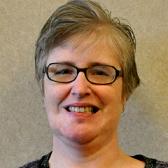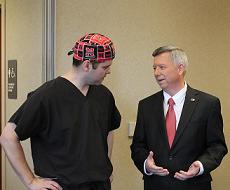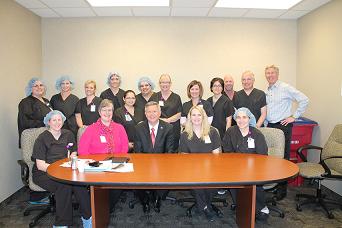 As healthcare changes, ambulatory surgery centers face myriad challenges and uncertainties. While each individual center can strive to address these issues, it is important to remember the power of a collective voice. Tracy Hoeft-Hoffman, RN, MSN, MBA, CASC, administrator of Fremont (Neb.) Surgical Center, discusses why surgery center administrators need to speak up and what advocating for the ASC industry can accomplish.
As healthcare changes, ambulatory surgery centers face myriad challenges and uncertainties. While each individual center can strive to address these issues, it is important to remember the power of a collective voice. Tracy Hoeft-Hoffman, RN, MSN, MBA, CASC, administrator of Fremont (Neb.) Surgical Center, discusses why surgery center administrators need to speak up and what advocating for the ASC industry can accomplish.
Sign up for our FREE E-Weekly for more coverage like this sent to your inbox!
Q: Why is it important for surgery center administrators to advocate for the ASC industry?
Tracy Hoeft-Hoffman: There are so many misconceptions about the ASC industry amongst our elected officials and the general public that we have must advocate for our centers and industry. It is not commonly known that ASCs are paid by most fee schedules up to 40 percent less than hospital outpatient department rates. It is our responsibility as ASC administrators to educate everyone we can about why we are a great choice for surgical care, including up to a 40 percent less cost than HOPDs, lower infection rates, higher patient satisfaction, and at least in our setting, the same surgeon who would perform your surgery in the hospital outpatient department.
Q: How can administrators become involved in advocacy activities?
TH: Administrators can become involved in advocacy activities in several ways. First, you can personally make contact with your elected officials so that when you contact them, they know who you are. Second, any time there is a bill introduced at your state or the federal level that may impact your center or ASCs as a whole, contact your elected officials. ASCA and state ASC associations keep us informed of what bills may affect our industry. When I receive a notice, I contact the appropriate elected officials about the bill and attempt to educate them as to why it is important for our industry to vote in our favor.
Q: What are a few examples of community advocacy efforts? State and national level advocacy?
TH: Advocacy in the community can be done in a variety of ways. Open houses are a good way to get the community into your center for a tour and education. You can do public open houses, open houses with the other members in your local Chamber of Commerce or focused open houses with key groups such as human resource departments from the large employers in your area. Likewise, attending Chamber events at other local businesses is a great way to meet other community leaders and advocate for your center.
Advocacy can also be done by being involved in the community through volunteering or your staff volunteering. I recently volunteered for three hours at a community food packing day and met several new people. They almost always ask what organization you are with, so I take advantage and tell them where I work and a little more about the center. I try to wear a shirt with our center logo on whenever I volunteer as well. We have a Relay for Life Team with the center logo on the back of our shirts so they can be seen while we are walking.
We also have to educate our payers. I have had some recent discussions about adding a procedure that isn't always on a fee schedule and one of the payer's representatives said that he had never had an ASC ask that question. I replied that while we are trying to grow our case volume, it would save the payer and the patient money by doing this at an ASC.
Advocacy at the state level can be done by contacting elected state officials. Don't hesitate to go to your state capital when it is in session and meet with your elected official or their assistant. Contact them when any bill is introduced that affects your center. Also, contact the committee who will be hearing the bill and ask them to vote for the outcome that is positive for your center. Go give testimony at the bill's public hearing, don't just rely on your association's lobbyist. Contact the lobbyist to get key talking points if you need to but, it is important to be heard! I also try to get the surgeons to write letters, even if I have to draft the letter for them.
Advocacy at the national level is equally as important as at the state level. ASCA does a great job of keeping us informed of what is going on at a national level but, it is up to us to act by contacting our senators and congressmen. It is a little more difficult to attend the hearings in Washington, DC but we can still get our voices heard by contacting our elected officials.
 Q: What are a few examples of your own advocacy efforts?
Q: What are a few examples of your own advocacy efforts?
TH: A recent example of my advocacy effort: ASCA has information by state regarding how much money ASCs have saved Medicare by performing such procedures as cataract surgeries and colonoscopies. I sent a copy of the information for Nebraska to all of our elected officials: city, state, and national, with a cover letter explaining who we are and how we can save payers, patients and Medicare/Medicaid money. I also invited them to tour our center any time they were in the area. A week later I received a call from Governor Heineman's office to see if he could tour our facility on May 3. I also heard back from one of the Senator's offices and our Congressman's office thanking me.
Q: How did you and your staff prepare for Governor Heineman's recent visit to your center?
 TH: When I found out Governor Heineman was going to tour, I let the Board of Manager and all of our physician owners know that he would be here to tour and asked some of them to be here for the tour as well. I let our staff know as well but, since they know the key things about our ASC being less cost and less risk, they didn't need to be educated. I sent out a press release and was able to get the local newspaper to come to the center during the tour. I ordered food for a reception for the staff, surgeons and Governor. We let our patients and their families who would be here when he toured know that he was coming.
TH: When I found out Governor Heineman was going to tour, I let the Board of Manager and all of our physician owners know that he would be here to tour and asked some of them to be here for the tour as well. I let our staff know as well but, since they know the key things about our ASC being less cost and less risk, they didn't need to be educated. I sent out a press release and was able to get the local newspaper to come to the center during the tour. I ordered food for a reception for the staff, surgeons and Governor. We let our patients and their families who would be here when he toured know that he was coming.
One of the surgeons and I showed Governor Heineman around ending in the area the reception was set up. I anticipated some of the questions he would ask, such as case mix and payer mix. He did ask us how he could get the Medicaid Caseworkers to steer their clients to us since we are less cost for Medicaid than a HOPD. The surgeon answered by saying that while we are happy to perform cases on Medicaid clients, they need to bring the payments up so we don't lose money doing a case. We also posted pictures of the Governor and staff on our center's Facebook page.
Q: What do you believe are some of the biggest challenges ahead for those involved in ASC advocacy?
TH: Our challenges for ASC advocacy are never ending. One of the biggest challenges is keeping our reimbursement going up rather than down, since all of our expenses continue to go up. Another challenge facing us is hospital employment of physicians, so we have to educate the general public on the money they can save by choosing to have their surgery performed in an ASC. We want them to be able to walk into any primary care office or surgeon's office and say, "I want my surgery done at Fremont Surgical Center because I know I will get great care and it will cost my insurance and myself less money." Another area that will require strong advocacy on our part, is where we fit in with the Affordable Care Act, since we already provide efficient care at less cost.
More Articles on ASC Issues:
ICD-10 Transition: Where Surgery Centers Should Be & How to Proceed
4 Strategic Tips for Smart Payer Contract Negotiation at Surgery Centers From Administrator Teve Eiler
How Does ASC Staffing Vary Across the US? 20 Statistics

